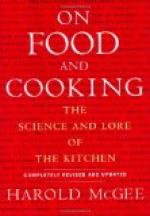THE ALIMENTARY CANAL
AN OVEN THERMOMETER
CONVENIENT KITCHEN TABLE
A DOUBLE BOILER
COMPARTMENT SINK FOR DISH-WASHING
OPEN
COMPARTMENT SINK FOR DISH-WASHING
CLOSED
THE STEAM COOKER
VEGETABLE PRESS
LEMON DRILL
THE HANDY WAITER
WALL CABINET
PERCOLATER HOLDER
KNEADING TABLE
DISH TOWEL RACK
VEGETABLE BRUSH
A DOUBLE BOILER
SECTIONAL VIEW OF WHEAT KERNEL
MEASURING CUPS
BREAD PAN
MEXICAN WOMEN MAKING TORTILLAS
STONE METATE
GEM IRONS
PERFORATED SHEET IRON PAN
FOR ROLLS
MAKING UNFERMENTED BREAD
CANNING UTENSILS
BAIN MARIE
CHINESE SOUP STRAINER
CREAMERY
ORIENTAL BUTTER MAKING
ARRANGEMENTS FOR STRAINING
STOCK
GRUEL STRAINER
EXTENSION STRAINER
WIRE DISHCLOTH
A PICNIC DINNER
INTRODUCTION.
No one thing over which we have control exerts so marked an influence upon our physical prosperity as the food we eat; and it is no exaggeration to say that well-selected and scientifically prepared food renders the partaker whose digestion permits of its being well assimilated, superior to his fellow-mortals in those qualities which will enable him to cope most successfully with life’s difficulties, and to fulfill the purpose of existence in the best and truest manner. The brain and other organs of the body are affected by the quality of the blood which nourishes them, and since the blood is made of the food eaten, it follows that the use of poor food will result in poor blood, poor muscles, poor brains, and poor bodies, incapable of first-class work in any capacity. Very few persons, however, ever stop to inquire what particular foods are best adapted to the manufacture of good blood and the maintenance of perfect health; but whatever gratifies the palate or is most conveniently obtained, is cooked and eaten without regard to its dietetic value. Far too many meals partake of the characteristics of the one described in the story told of a clergyman who, when requested to ask a blessing upon a dinner consisting of bread, hot and tinged with saleratus, meat fried to a crisp, potatoes swimming in grease, mince pie, preserves, and pickles, demurred on the ground that the dinner was “not worth a blessing.” He might with equal propriety have added, “and not worth eating.”
The subject of diet and its relation to human welfare, is one deserving of the most careful consideration. It should be studied as a science, to enable us to choose such materials as are best adapted to our needs under the varying circumstances of climate growth, occupation, and the numerous changing conditions of the human system; as an art, that we may become so skilled in the preparation of the articles selected as to make them both appetizing and healthful. It is an unfortunate fact that even among experienced




